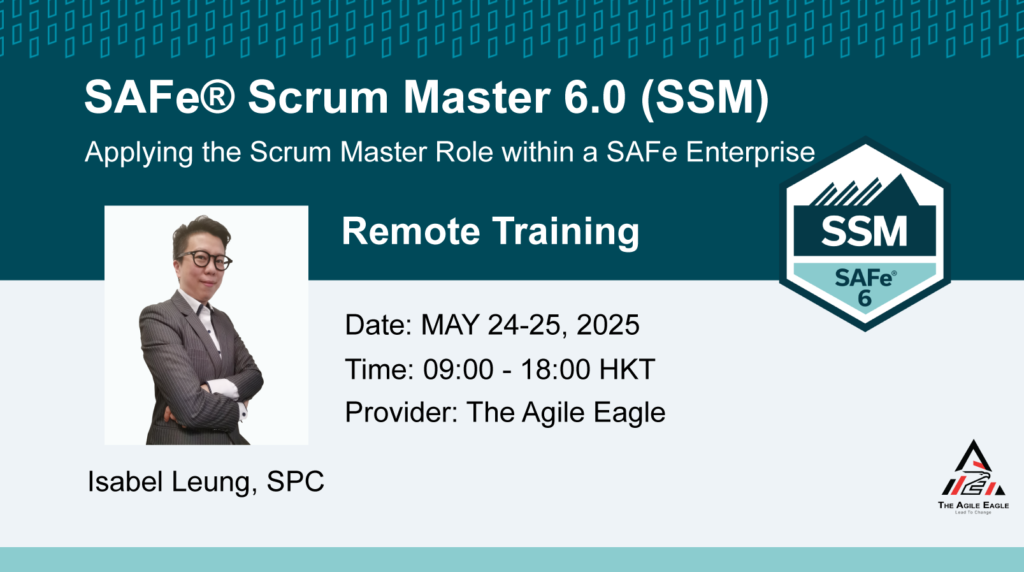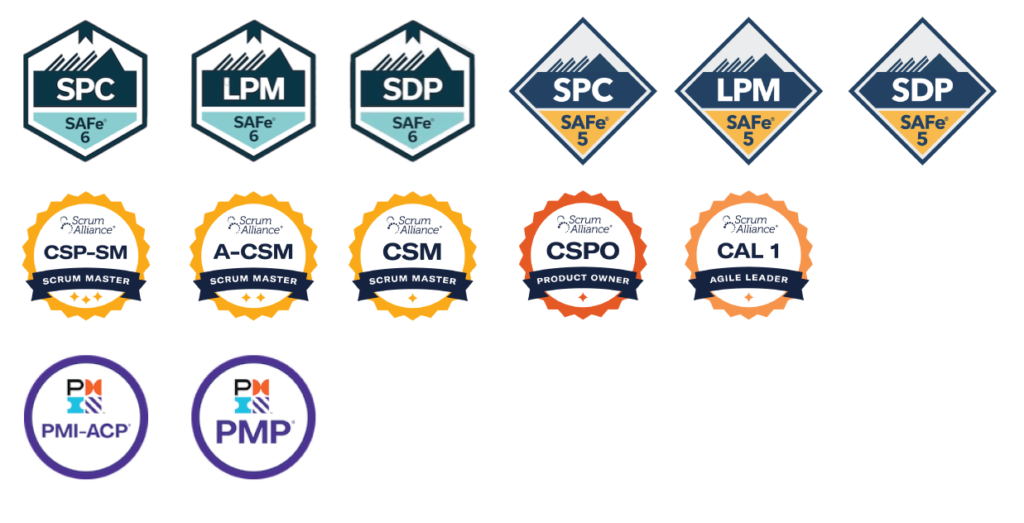
When and where
Date: MAY 24-25, 2025
Time: 9:00AM – 6:00PM (HKT)
Location: Online
Trainer: Isabel Leung
Refund Policy
Refunds up to 7 days before event
Price

Course Description
SAFe® Scrum Master
Applying the Scrum Master Role within a SAFe Enterprise
With SAFe® Scrum Master Certification Summary
In this two-day REMOTE course, attendees gain an understanding of the role of a Scrum Master in a SAFe enterprise. Unlike traditional Scrum Master training that focuses on the fundamentals of team-level Scrum, the SAFe Scrum Master course explores the role of the Scrum Master in the context of the entire enterprise, and prepares attendees to successfully plan and execute the Program Increment (PI), the primary enabler of alignment throughout all levels of a SAFe organization. This includes learning the key components of Agile at scale development, how Scrum is facilitated throughout the enterprise, and how to execute Iteration Planning.
Attendees discover how to build high performing Agile teams by becoming a servant leader and coach, and how to coach those teams to deliver the maximum business value at scale. SAFe 6 Scrum Master (SSM) certification signifies that people are prepared to perform the role of Scrum Master in a SAFe environment, increasing their value to teams and organizations that are implementing SAFe.
Who Will Benefit?
Intended for people new to the role of Scrum Master, or people wanting to better understand the role and how it fits in a SAFe enterprise, attendees typically include:
- New or existing Scrum Masters
- Team Leads
- Release Train Engineers
Topics Covered
- Introducing Scrum in SAFe®
- Characterizing the role of the Scrum Master
- Experiencing Program Increment planning
- Facilitating Iteration execution
- Finishing the Program Increment
- Coaching the Agile team
What you’ll learn
After attending the class, attendees should be able to:
- Describe Scrum in a SAFe enterprise
- Facilitate Scrum events
- Facilitate effective Iteration execution
- Support effective Program Increment execution
- Support relentless improvement
- Coach Agile teams for maximum business results
- Support DevOps implementation
Prerequisites
All are welcome to attend the course, regardless of experience. However, the following prerequisites are highly recommended for those who intend to take the SAFe® Scrum Master (SSM) certification exam:
- Familiarity with Agile concepts and principles
- Awareness of Scrum, Kanban and XP
- Working knowledge of software and hardware development processes
What You Get
Class registration includes:
- Attendee digital workbook
- Preparation and eligibility to take the SAFe® Scrum Master (SSM) exam
- One-year membership to the SAFe Community Platform
- SAFe® Scrum Master (SSM) certification upon passing the exam
- Course certificate of completion
- Attendees must attend both days of the course in order to qualify for the exam
Annual Renewal
Certifications expire one year from the date of certification is earned.
- Renewal fee: USD 100/year
Professional Development Units (PDUs) and Scrum Education Units (SEUs)
- You may be eligible to apply for 15 PDUs toward your continuing education requirements with the Project Management Institute (PMI) for PMP, PgMP, and PMI-ACP certifications
- You may be eligible to apply for SEUs under Category C, toward earning or renewing your CSP through the Scrum Alliance
About the Trainer
Isabel Leung, SAFe®Practice Consultant (SPC)
With over 15 years of managing products and projects. Isabel has been an agile practitioner since 2009. Isabel helps organizations on lean-agile startup, building and coaching Agile Team, transform organizations in agile practice and leading team to deliver projects in waterfall, agile or hybrid approach.
Isabel draws on a decade of experience managing large scale products and projects in real estate, airline, social media, tourism, public transportation, telecommunications, human resources, recruitment and Data Network & Infrastructure.
As an SPC, Isabel is passionate about helping organizations create a better environment to deliver value and improve quality by applying agile methodologies and practices in ways that scale effectively.

